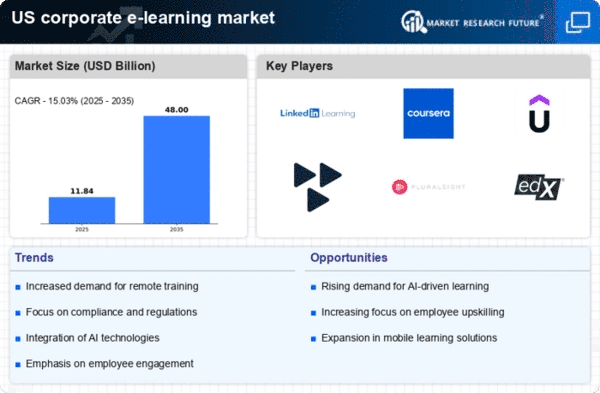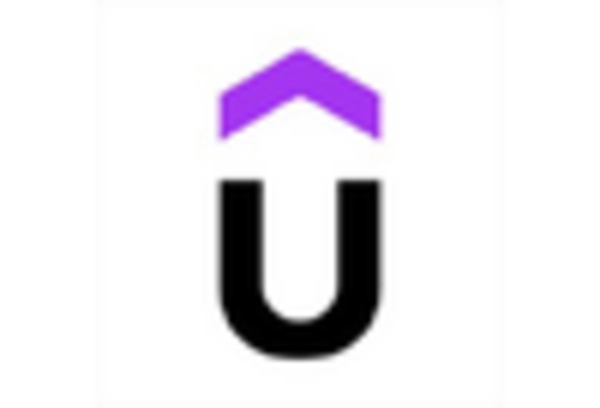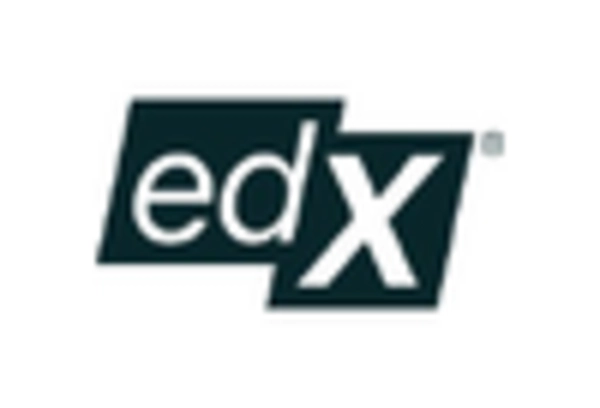Shift Towards Remote Work Culture
The corporate e-learning market is benefiting from the shift towards a remote work culture. As organizations adapt to flexible work arrangements, the demand for online training solutions has surged. E-learning platforms provide employees with the flexibility to access training materials from anywhere, facilitating continuous learning regardless of location. This trend is supported by data indicating that remote workers are 20% more likely to engage in online training compared to their in-office counterparts. Consequently, the corporate e-learning market is likely to see sustained growth as companies invest in scalable e-learning solutions that cater to a geographically dispersed workforce.
Rising Demand for Compliance Training
The corporate e-learning market is experiencing increased demand for compliance training as organizations strive to meet regulatory requirements. With the complexity of legal and industry standards, companies are turning to e-learning solutions to ensure that employees are well-informed about compliance issues. This trend is underscored by the fact that approximately 60% of organizations report using e-learning for compliance training purposes. By leveraging e-learning platforms, companies can deliver consistent and up-to-date training, reducing the risk of non-compliance. As regulatory landscapes evolve, the corporate e-learning market is expected to grow as businesses prioritize compliance training to mitigate potential legal risks.
Increased Focus on Employee Development
In the corporate e-learning market, there is a growing emphasis on employee development as organizations recognize the importance of continuous learning. Companies are investing in e-learning solutions to upskill their workforce, which is essential for maintaining competitiveness in a rapidly changing business environment. According to recent data, approximately 70% of employees believe that learning opportunities influence their job satisfaction. This trend suggests that organizations prioritizing employee development through e-learning are likely to see improved retention rates and enhanced productivity. As a result, the corporate e-learning market is expected to expand as businesses increasingly allocate budgets towards comprehensive training programs that foster professional growth.
Technological Advancements in E-Learning
The corporate e-learning market is experiencing a surge due to rapid technological advancements. Innovations such as artificial intelligence (AI), machine learning, and virtual reality (VR) are transforming how training is delivered. Companies are increasingly adopting these technologies to create immersive and interactive learning experiences. For instance, AI-driven platforms can analyze employee performance and tailor content accordingly, enhancing engagement and retention. The market is projected to grow at a CAGR of approximately 10.5% from 2025 to 2030, indicating a robust demand for tech-driven solutions. As organizations seek to improve training efficiency and effectiveness, the integration of advanced technologies is likely to play a pivotal role in shaping the future of the corporate e-learning market.
Cost-Effectiveness of E-Learning Solutions
The corporate e-learning market is recognized for its cost-effectiveness compared to traditional training methods. Organizations are finding that e-learning solutions can significantly reduce training costs by minimizing travel expenses and the need for physical materials. Studies indicate that companies can save up to 50% on training costs by implementing e-learning programs. This financial advantage is particularly appealing to businesses looking to optimize their training budgets. As a result, the corporate e-learning market is likely to expand as more organizations seek to leverage the economic benefits of online training solutions while maintaining high-quality learning experiences.

















